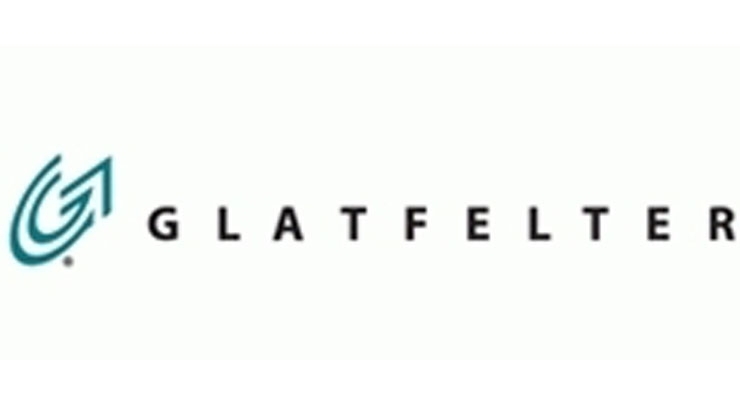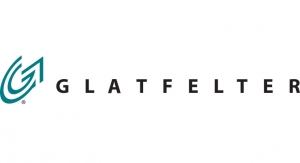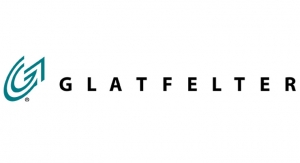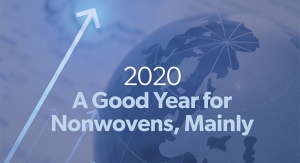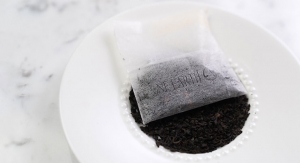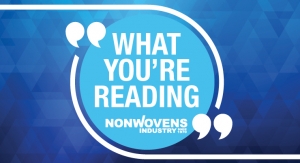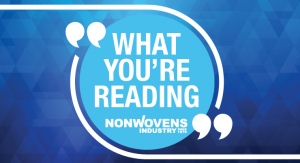09.11.17
York, PA
www.glatfelter.com
2017 Nonwovens Sales: $627 million
Key Personnel
Dante Parrini, chairman and CEO; John Jacunski, executive vice president and CFO; Christopher Astley, senior vice president and business unit president, Advanced Airlaid Materials; Martin Rapp, senior vice president & business unit president, composite fibers
Plants
Canada, Germany, U.S., France, Philippines
Processes
Airlaid, wetlaid
A new plant and a major acquisition are the big news stories at Glatfelter, the world’s largest airlaid producer and a manufacturer of wetlaid nonwovens for the single-serve tea and coffee market and wall coverings applications. The company’s total nonwovens sales clocked in at $627 million but are expected to grow thanks to the commercialization of its new North American airlaid line in Fort Smith, AR, and the acquisition of Georgia-Pacific’s European airlaid business.
In June, the company announced it would purchase G-P’s operations in Steinfurt, Germany, as well as its sales offices in France and Italy for $185 million, subject to customary purchase price adjustments. The Steinfurt facility produces high-quality airlaid products for the table-top, wipes, hygiene, food pad, and other nonwoven materials markets, competing in the marketplace with nonwoven technologies and substrates, as well as other materials focused primarily on consumer based end-use applications. The Steinfurt facility is a state-of-the-art, 32,000-metric-ton-capacity manufacturing facility that employs approximately 220 people.
“Glatfelter’s agreement to acquire the European nonwovens business demonstrates our commitment to building leading positions in global growth markets for engineered materials,” says Dante Parrini, chairman and CEO of Glatfelter. “Steinfurt’s products and technologies complement our current airlaid business very well and the acquisition provides synergistic capacity increase opportunities and an improved cost structure to support our ability to serve customers in growing consumer and industrial markets. From a financial perspective, the investment provides an attractive return on capital, is immediately accretive and will deliver attractive EBITDA margins in a growing market.”
In 2017, the business generated net sales of $99 million and EBITDA of $18 million. The company expects to realize synergies in excess of approximately $6 million per year within three years, and expects to incur one-time costs of approximately $7 million for transaction fees and integration.
Glatfelter announced the acquisition in June 2018, just eight days after the Grand Opening Ceremony for its state-of-the-art airlaid facility in Arkansas, which began operations during the first quarter of 2018.
The site is the company’s first investment in the U.S. Existing facilities are located in Gatineau, Canada, and Falkenhagen, Germany. The additional 22,000 short tons of production capacity made at the site increases the company’s total global airlaid materials capacity to approximately 129,000 short tons, not including the G-P acquisition, making Glatfelter the largest producer of airlaid materials in the world.
Glatfelter’s airlaid materials are found in a wide range of personal care products, including feminine hygiene and adult incontinence products, specialty wipes, tabletop, and homecare applications. The Fort Smith facility primarily supplies material to the specialty wipes market.
“We are excited to bring this new capacity and capabilities to our customers serving the growing North American market,” says Parrini.
In 2017, Glatfelter’s airlaid sales reached $256 million, 70% of which were sold to customers in the feminine hygiene market. Other important markets for the company include specialty wipes and adult incontinence, which both reported sales growth of 14% this year.
Outside of airlaid, Glatfelter makes wetlaid nonwovens for markets like the single serve tea and coffee and wallcoverings, which are a part of its Composites Fibers business. Sales decreased slightly in food and beverage but were up significantly in wallcoverings. Looking ahead the company plans to continue to capitalize on both of these markets, which are considered to be growing globally by making targeted investments to create incremental capacity to serve growth markets and leveraging innovation resources to drive new product and new business development.
In addition to Advanced Airlaid and Composite Fibers, Glatfelter operates a third division Specialty Papers. The largest of its three divisions, representing about 50% of sales, specialty papers serves many market segments served by declining demand resulting in excess capacity, lower operating rates and pricing pressures. In August, Glatfelter announced plans to sell this division to private equity firm Lindsay Graham. The company had previously announced, in February 2018, that it would undertake a review of strategic alternatives for specialty papers including the potential sale of the unit.
Parrini says, “Our Specialty Papers business continued to face challenging market conditions which, when coupled with operating inefficiencies, led to lower profitability during the quarter. We are encouraged by recent announcements of price increases and additional industry capacity being taken out of the market which should be constructive for the business going forward. Our focus remains on aggressively pursuing cost efficiencies and process improvements to improve profitability.”
www.glatfelter.com
2017 Nonwovens Sales: $627 million
Key Personnel
Dante Parrini, chairman and CEO; John Jacunski, executive vice president and CFO; Christopher Astley, senior vice president and business unit president, Advanced Airlaid Materials; Martin Rapp, senior vice president & business unit president, composite fibers
Plants
Canada, Germany, U.S., France, Philippines
Processes
Airlaid, wetlaid
A new plant and a major acquisition are the big news stories at Glatfelter, the world’s largest airlaid producer and a manufacturer of wetlaid nonwovens for the single-serve tea and coffee market and wall coverings applications. The company’s total nonwovens sales clocked in at $627 million but are expected to grow thanks to the commercialization of its new North American airlaid line in Fort Smith, AR, and the acquisition of Georgia-Pacific’s European airlaid business.
In June, the company announced it would purchase G-P’s operations in Steinfurt, Germany, as well as its sales offices in France and Italy for $185 million, subject to customary purchase price adjustments. The Steinfurt facility produces high-quality airlaid products for the table-top, wipes, hygiene, food pad, and other nonwoven materials markets, competing in the marketplace with nonwoven technologies and substrates, as well as other materials focused primarily on consumer based end-use applications. The Steinfurt facility is a state-of-the-art, 32,000-metric-ton-capacity manufacturing facility that employs approximately 220 people.
“Glatfelter’s agreement to acquire the European nonwovens business demonstrates our commitment to building leading positions in global growth markets for engineered materials,” says Dante Parrini, chairman and CEO of Glatfelter. “Steinfurt’s products and technologies complement our current airlaid business very well and the acquisition provides synergistic capacity increase opportunities and an improved cost structure to support our ability to serve customers in growing consumer and industrial markets. From a financial perspective, the investment provides an attractive return on capital, is immediately accretive and will deliver attractive EBITDA margins in a growing market.”
In 2017, the business generated net sales of $99 million and EBITDA of $18 million. The company expects to realize synergies in excess of approximately $6 million per year within three years, and expects to incur one-time costs of approximately $7 million for transaction fees and integration.
Glatfelter announced the acquisition in June 2018, just eight days after the Grand Opening Ceremony for its state-of-the-art airlaid facility in Arkansas, which began operations during the first quarter of 2018.
The site is the company’s first investment in the U.S. Existing facilities are located in Gatineau, Canada, and Falkenhagen, Germany. The additional 22,000 short tons of production capacity made at the site increases the company’s total global airlaid materials capacity to approximately 129,000 short tons, not including the G-P acquisition, making Glatfelter the largest producer of airlaid materials in the world.
Glatfelter’s airlaid materials are found in a wide range of personal care products, including feminine hygiene and adult incontinence products, specialty wipes, tabletop, and homecare applications. The Fort Smith facility primarily supplies material to the specialty wipes market.
“We are excited to bring this new capacity and capabilities to our customers serving the growing North American market,” says Parrini.
In 2017, Glatfelter’s airlaid sales reached $256 million, 70% of which were sold to customers in the feminine hygiene market. Other important markets for the company include specialty wipes and adult incontinence, which both reported sales growth of 14% this year.
Outside of airlaid, Glatfelter makes wetlaid nonwovens for markets like the single serve tea and coffee and wallcoverings, which are a part of its Composites Fibers business. Sales decreased slightly in food and beverage but were up significantly in wallcoverings. Looking ahead the company plans to continue to capitalize on both of these markets, which are considered to be growing globally by making targeted investments to create incremental capacity to serve growth markets and leveraging innovation resources to drive new product and new business development.
In addition to Advanced Airlaid and Composite Fibers, Glatfelter operates a third division Specialty Papers. The largest of its three divisions, representing about 50% of sales, specialty papers serves many market segments served by declining demand resulting in excess capacity, lower operating rates and pricing pressures. In August, Glatfelter announced plans to sell this division to private equity firm Lindsay Graham. The company had previously announced, in February 2018, that it would undertake a review of strategic alternatives for specialty papers including the potential sale of the unit.
Parrini says, “Our Specialty Papers business continued to face challenging market conditions which, when coupled with operating inefficiencies, led to lower profitability during the quarter. We are encouraged by recent announcements of price increases and additional industry capacity being taken out of the market which should be constructive for the business going forward. Our focus remains on aggressively pursuing cost efficiencies and process improvements to improve profitability.”

